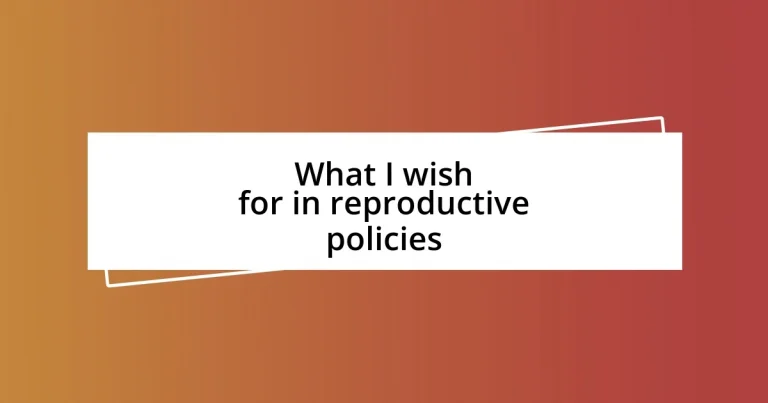Key takeaways:
- Inclusive reproductive health policies are crucial for equitable access, culturally competent care, and emotional support, empowering individuals to make informed choices.
- Key areas for improvement in reproductive policies include expanding access to services, implementing comprehensive sexual education, and integrating mental health support.
- The future of reproductive policies should focus on quality care, holistic approaches that combine physical and mental health, and promoting shared responsibility in family planning decisions.
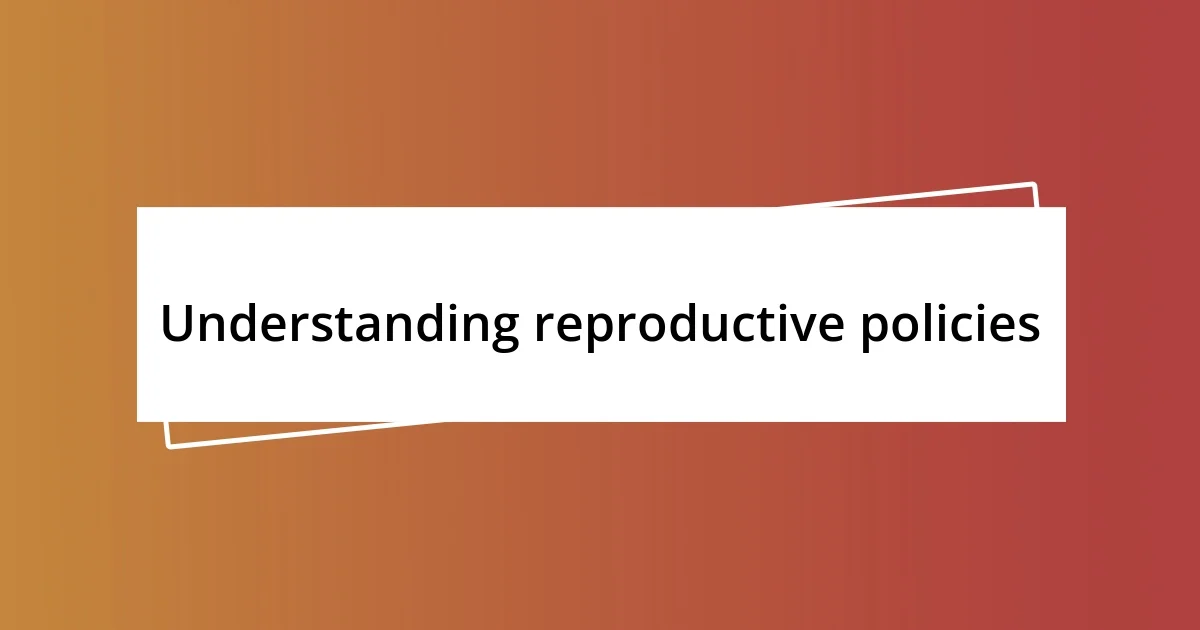
Understanding reproductive policies
Reproductive policies encompass a broad range of rules and regulations that govern reproductive health and rights. They impact everything from access to contraception to prenatal care and abortion services, shaping how individuals make personal choices. Have you ever considered how these policies can reflect societal values or even influence your life decisions?
As someone who has navigated the maze of reproductive health services, I vividly remember the frustration of encountering roadblocks due to restrictive policies. It made me question why some individuals have easier access to necessary services while others struggle. This disparity highlights the importance of inclusive policies that recognize the diverse needs of all people, fostering equality and empowerment in reproductive health.
Diving deeper into this topic, I find myself reflecting on the emotional weight of reproductive choices. For many, these decisions are not just administrative but profoundly personal. How do we ensure that reproductive policies support emotional well-being and provide the necessary support systems? To create meaningful change, people must be at the center of these discussions, reflecting their experiences and aspirations.
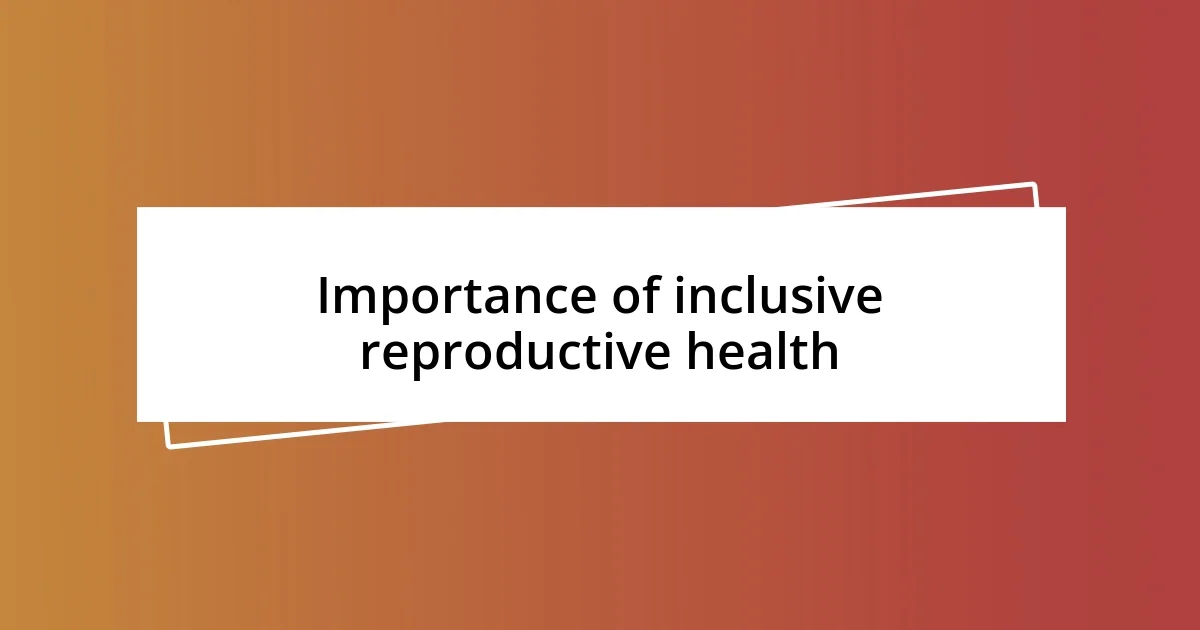
Importance of inclusive reproductive health
Inclusive reproductive health is essential because it recognizes the unique needs of diverse populations. I’ve seen firsthand how a lack of inclusivity can impact individuals in vulnerable situations. For instance, a friend of mine who identified as non-binary struggled to find a healthcare provider who understood their specific health needs. This experience left them feeling marginalized in a system that should have embraced them.
Here are some critical reasons why inclusive reproductive health matters:
- Equitable Access: Everyone should have unhindered access to reproductive health services, regardless of gender identity, socioeconomic status, or cultural background.
- Culturally Competent Care: Healthcare providers must be trained to cater to the diverse cultural beliefs and practices surrounding reproductive health.
- Empowered Citizens: Inclusive policies empower individuals to make informed decisions about their bodies and futures, fostering autonomy and self-determination.
- Improved Health Outcomes: By addressing the unique needs of various groups, we can enhance overall community health and reduce disparities.
- Emotional Support: Inclusive reproductive health acknowledges the emotional aspects of reproductive choices, ensuring people receive comprehensive care that addresses both physical and psychological needs.
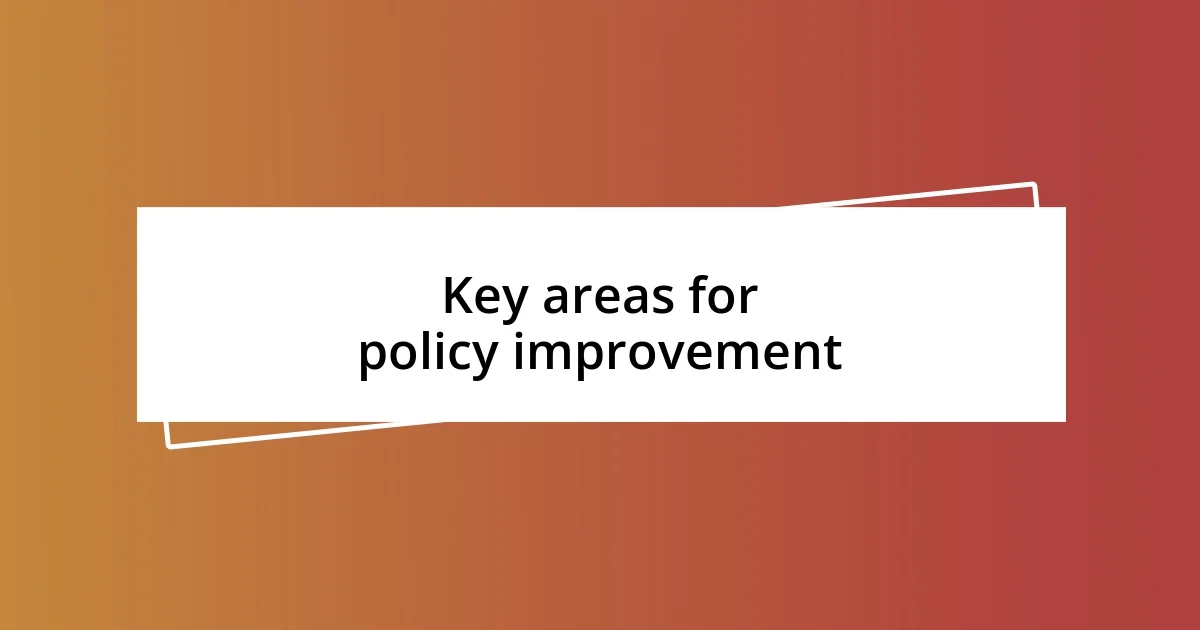
Key areas for policy improvement
One of the key areas for policy improvement is the expansion of access to reproductive health services. I recall a time when a close family member faced hurdles due to a lack of available clinics in her area. It shocked me to learn that geographical restrictions could hinder someone’s access to essential services like contraception and prenatal care. Expanding access to these services is crucial for ensuring that everyone can make informed choices about their reproductive health, regardless of where they live.
Another important area is the need for comprehensive sexual education. Reflecting on my own school experiences, I remember how limited the information was, leading to confusion and misinformation among my peers. Implementing a robust sexual education curriculum that encompasses consent, safe practices, and reproductive rights not only empowers individuals but also cultivates an informed community. Knowledge, I believe, is a powerful tool for making thoughtful and healthy decisions.
Finally, there is a pressing need for policies that support mental health in conjunction with reproductive health. I have seen friends struggle with the emotional turmoil surrounding reproductive choices, and it often felt like the healthcare system neglected this vital aspect. Policies should actively promote mental health resources alongside physical health services, recognizing that emotional well-being is an integral part of overall reproductive health. This holistic approach can significantly improve the support system for individuals navigating these profound choices.
| Key Area | Importance |
|---|---|
| Expansion of Access | Ensures everyone can access essential reproductive health services, irrespective of location. |
| Comprehensive Sexual Education | Empowers individuals with knowledge to make informed decisions and promotes community awareness. |
| Mental Health Support | Recognizes the emotional aspects of reproductive choices and provides necessary mental health resources. |
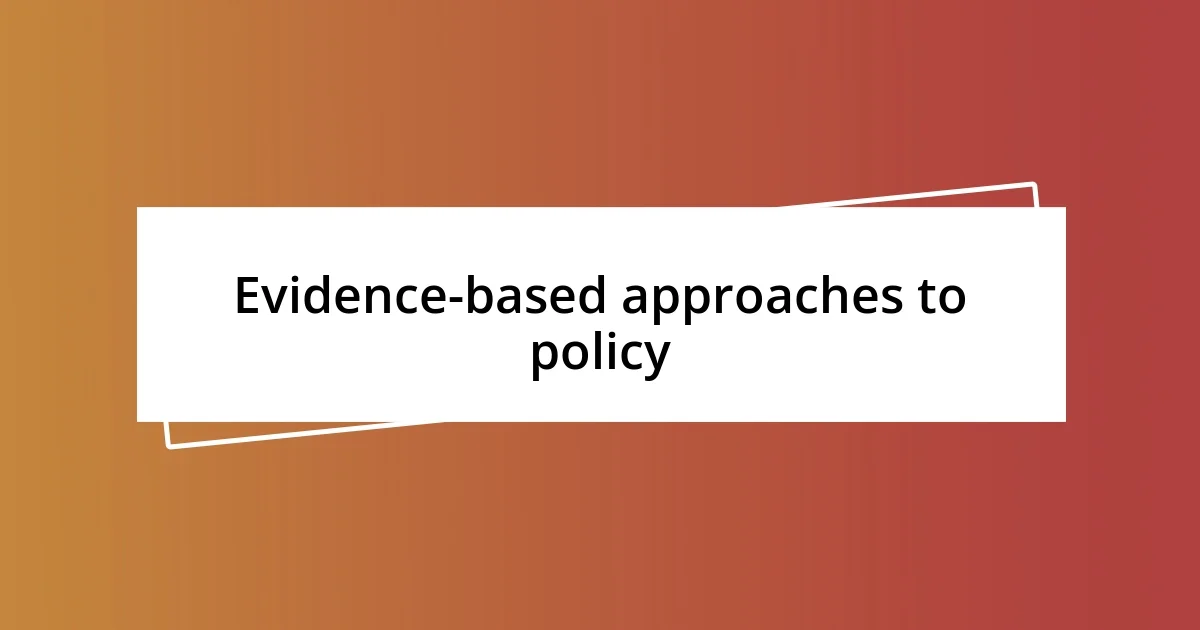
Evidence-based approaches to policy
When it comes to crafting effective reproductive policies, I firmly believe that evidence-based approaches are essential. I remember attending a workshop where we reviewed data that highlighted the significant differences in outcomes when policies were shaped by solid evidence versus those rooted in anecdotes or assumptions. I couldn’t help but feel inspired by how systematic research transformed services in jurisdictions with comprehensive data, leading to better health outcomes for everyone.
Integrating research findings into policy decisions not only enhances the credibility of those policies but also builds public trust. Reflecting on my own observations, I’ve seen how communities flourish when policies are underpinned by strong evidence. They become models for effective practices, inviting other regions to adopt similar frameworks. Isn’t it reassuring to know that decisions impacting individuals’ lives can actually stem from proven strategies rather than guesswork?
Moreover, effective reproductive health policies can’t simply exist in a vacuum. I’ve noted that continuous evaluation and feedback loops play a crucial role in refining these policies over time. This iterative process not only considers the lived experiences of those affected but allows for adjustments based on real-life data. By asking questions like “What works?”, and responding to feedback, we can create a dynamic approach to reproductive health that truly serves the community’s needs. Wouldn’t it be great to see policies evolve and improve, just like any meaningful conversation we have?
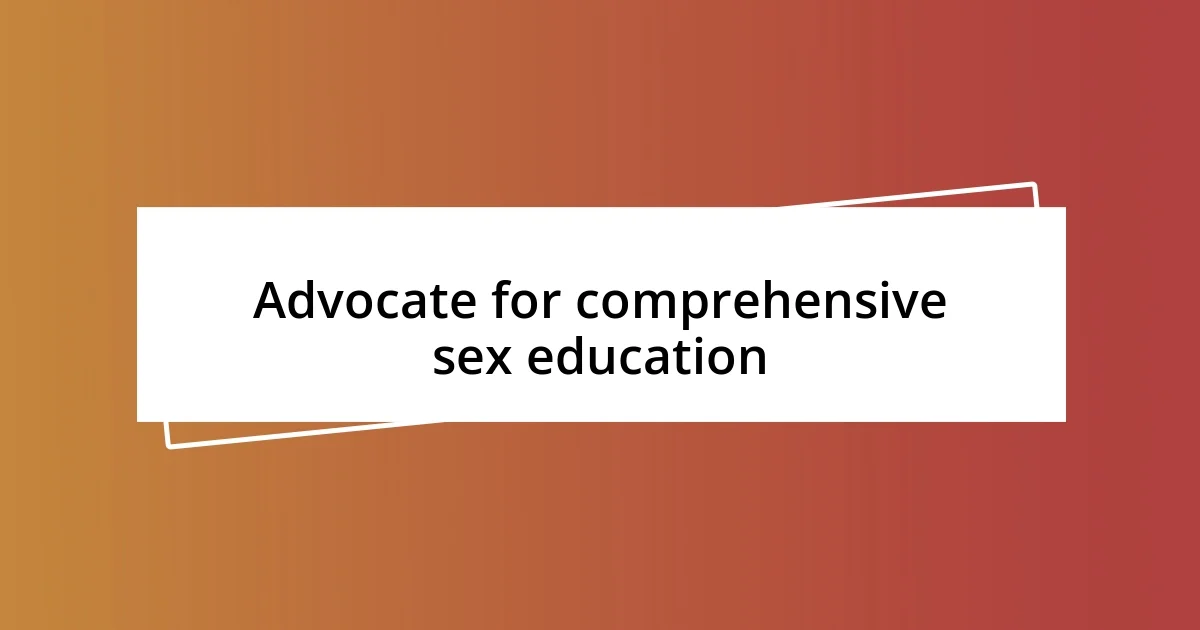
Advocate for comprehensive sex education
Advocating for comprehensive sex education is something I feel passionately about. I remember a moment in high school when one of my friends asked a very basic question about reproductive health, and the awkward silence that followed was deafening. It struck me how ill-prepared we all were to talk about such a vital aspect of our lives. Comprehensive education can bridge that gap, equipping young people with the knowledge they need to navigate their sexual health confidently.
I’ve seen firsthand the ripple effects of inadequate sexual education. One of my classmates became pregnant in our senior year, and it shattered her plans and dreams, and frankly, it felt preventable. Imagine if she’d received clear, unbiased information about contraception and relationships earlier. Comprehensive sexual education could have empowered her to make informed choices for herself. It’s not just about mechanics; it’s about understanding consent, respect, and personal agency.
Looking back, I realize that a significant part of my own self-awareness and confidence around relationships came from the discussions we had among friends, often sparked by curiosity and frustration with the limited curriculum we were taught. So, why should we leave future generations to figure it out on their own? Comprehensive sexual education can foster open conversations, help normalize these topics, and ultimately create a healthier dialogue around sexuality and relationships.
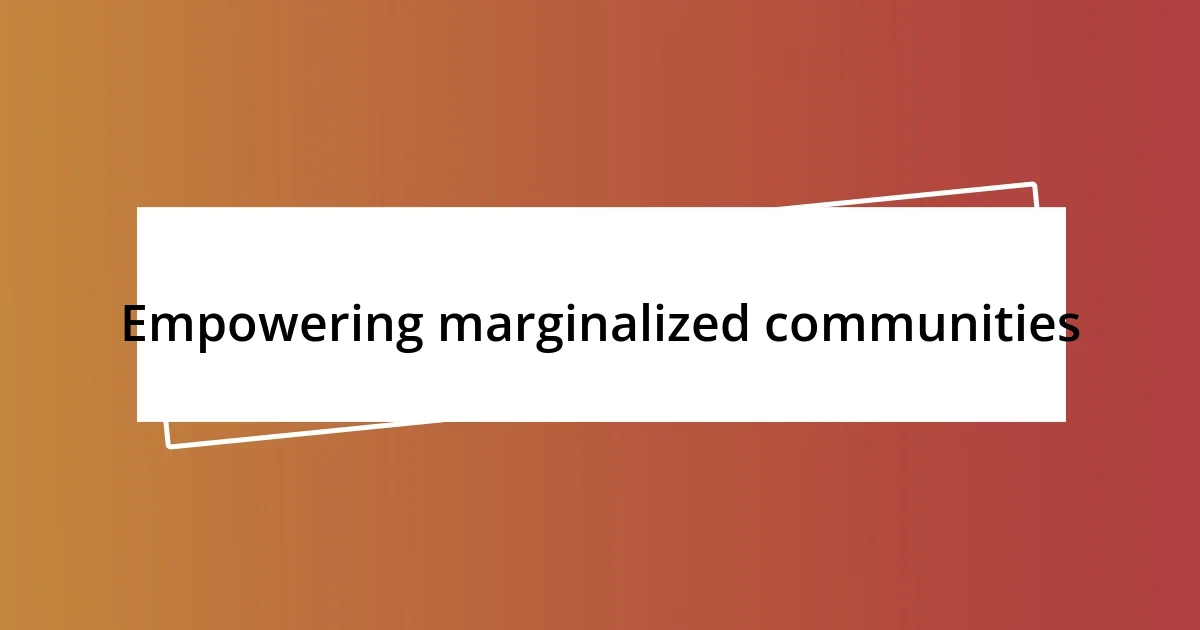
Empowering marginalized communities
When I think about empowering marginalized communities, I can’t help but remember the environmental and social barriers that many of these groups face in accessing reproductive health services. In my experience, truly inclusive policies require listening to the voices of those most impacted. I recall a community meeting where local leaders shared their struggles and aspirations; their stories highlighted the urgent need for tailored approaches that genuinely reflect their realities.
It’s essential to recognize that marginalized communities often possess unique cultural and societal dynamics that influence their reproductive health choices. I learned this firsthand while volunteering at a clinic that served underrepresented populations. I observed how empowering these communities to engage in the policymaking process not only led to more relevant health solutions but also fostered a sense of ownership. Just think about it: what if those affected by the policies had a seat at the table? Their insights could illuminate challenges we can’t always see from the outside.
Moreover, I believe financial accessibility plays a critical role in empowerment. I remember speaking with a young mother who had to choose between buying groceries and accessing birth control. That stark choice shouldn’t exist. Multi-faceted support, including subsidized services and transportation, can help dismantle the systemic barriers many marginalized individuals encounter. Isn’t it high time we bridged these gaps to ensure that everyone has an equal opportunity to thrive and make informed reproductive choices?
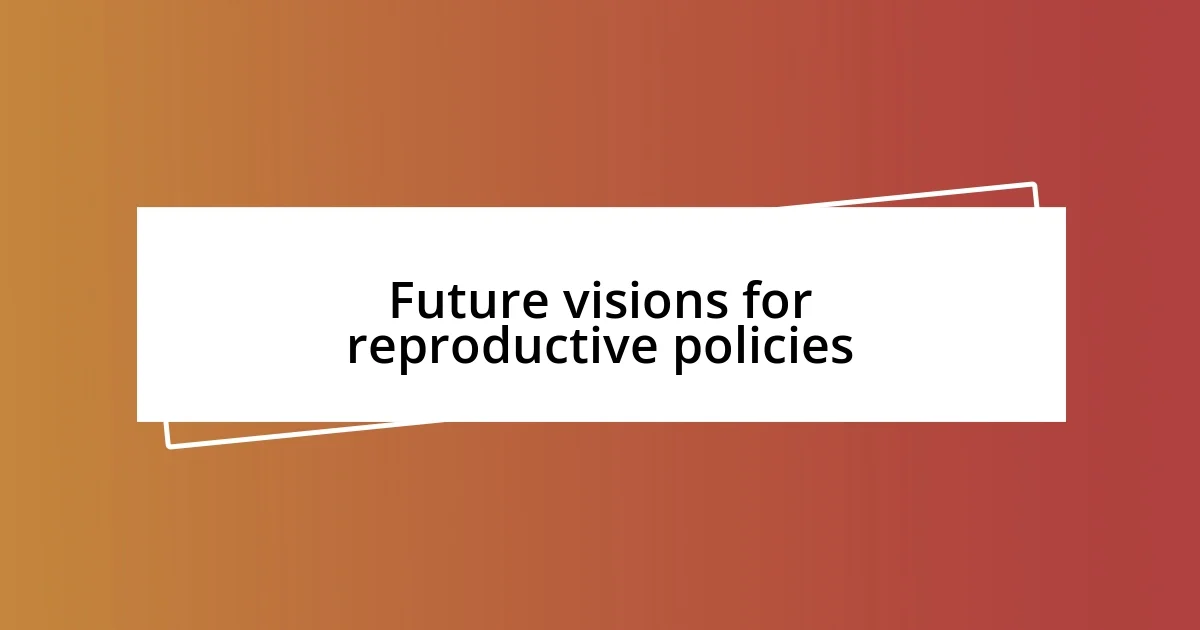
Future visions for reproductive policies
Looking ahead, I envision reproductive policies that prioritize not just access but also the quality of care individuals receive. I recall a time during a community health fair where a nurse explained different contraceptive options in a way that felt approachable and inclusive. That experience showed me how essential it is for medical professionals to connect on a personal level. What if every clinic provided an environment where patients felt safe to ask questions and share their concerns without judgment? This could transform the healthcare experience into one that truly serves the needs of individuals.
Another critical aspect I see for the future is integrating mental health support into reproductive health services. I had a friend who went through a tough time after a miscarriage, and the emotional toll she faced was compounded by the lack of resources available to her. Imagine if health policies included routine mental health check-ins alongside reproductive health consultations. Such an approach could validate the emotional struggles individuals face and foster a more holistic view of health.
Additionally, I think it’s vital to promote a shared responsibility in reproductive health. I’ve often sensed that discussions around family planning can be imbalanced, often leaving women to bear the brunt of the burden alone. I remember discussing this with a group of friends; we collectively wondered, why is it that men are frequently absent from these conversations? Moving forward, policies need to encourage a culture where both partners actively engage in the decision-making process, emphasizing that reproductive health is a shared journey.











